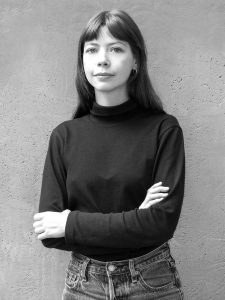Beverly Engelbrecht

Kurzvita
- since 2023 Associate Fellow at DFG Research Training Group 2227 “Identity and Heritage”,
- Bauhaus-Universität Weimar
- since 2023 Scholarship holder, Thüringer Graduiertenförderung, Bauhaus-Universität Weimar
- 2022–2023 Scholarship holder, Bauhaus-Startstipendium, Bauhaus-Universität Weimar
- 2021–2023 Teaching and Research Assistant, Chair of Design and Housing, Bauhaus-Universität Weimar
- 2017–2021 Master Architecture, Bauhaus-Universität Weimar
- 2017–2018 Internship, Miller & Maranta Architekten, Basel
- 2013–2017, 2020–2021 Commitment in the interdisciplinary and collaborative working collective
- “Studio Wägetechnik e.V.“, Weimar
- 2013–2017 Bachelor Architecture, Bauhaus-Universität Weimar
- 2012–2013 Preparatory studies, Leipzig School of Design
Kontakt
Bauhaus University Weimar
Faculty of Architecture and Urbanism
DFG Research Training Group 2227 “Idenity and Heritage”
Office:
Ernst Neufert Haus
Rudolstädter Str. 7
D-99428 Weimar (Ortsteil Gelmeroda)
beverly.engelbrecht[at]uni-weimar.de
Architectures of Sex Work. An investigation of two neighborhoods in Berlin.
In a seminal radio lecture in 1966, Michel Foucault coined the term heterotopia as a counter-place amid socially legitimized places (cf. ibid. 2021: 9ff.). This other space, like a mirror, would simultaneously represent, reflect, and refute the normal (normalized) spaces (cf. ibid. 2021: 9ff.). In addition to cemeteries, parks and prisons, the philosopher also included brothels among the heterotopias. Based on this conceptual relationship, I examine two neighbourhoods in Berlin to see how architectures of sex work manifest themselves spatially and what interactions can be recorded between them and the social, political, and legislative space within which they are constructed. For this purpose, I extend Foucault’s classification and under the term architectures of sex work investigate the places of work of sex workers where, within the meaning of anarchitectures, (often precarious) spaces of different scales are assigned, temporarily appropriated, or occupied. These places will be explored through case studies of Kurfürstenkiez and the neighbourhood around Oranienburger Straße, as well as architectures that are in some way related to them. I am interested in the question of whether such architectures of sex work can be understood as a model for a contemporary production of space in which dynamics of socio-political exclusion and invisibility overlap with practices of informal and fluid appropriation and occupation.
The scope of the study includes developments within Berlin as a city without a restricted area, representing a broad spectrum within hierarchized sex trade. The period of investigation extends from 1961, i.e. with the sealing-off of the sector border and the erection of the Berlin Wall, to the present. This allows me to examine the actions of different political regimes, and during the period of the divided Berlin even in relation to each other. Within Berlin, I will compare the developments and conditions of two neighbourhoods. More specifically, I want to investigate the genesis of the currently highly precarious street prostitution of the Kurfürstenkiez (formerly West Berlin) and today’s touristy and gentrified neighbourhood around Oranienburger Straße (formerly East Berlin). With this aim, I examine the social, political, and legal developments in the city through the lens of locations and spaces of sex work (hour hotels, shows, bars, apartments, street prostitution, brothels, etc.).
The PhD project treats sex work in the context of being criminalized for a long time, marginalized, and moralized to this day. Consequently, sex workers in urban spaces were and are often only (temporarily) tolerated and exposed to violence and exploitation. Interwoven with these dynamics are social positions on gender, class, sexual orientation, and ethnicity, which I approach from a critical constructivist as well as an intersectional feminist perspective.
The project is a deductive and inductive (theoretical and empirical) research work of architecture, which also intersects with related disciplines. To allow different perspectives on the research object, I choose a combination of methods of different qualitative surveys (analyses of literature and archival documents as well as interviews), which will be evaluated by forming a synthesis. The research results will be recorded in text-based and artistic-creative form (drawings and further visual representations of the spaces). By working with artistic investigation, I want to reach conclusions about specific (precarious) forms of spatial production that a purely text-based work does not allow for. I also consider producing planning material as a basis for future equitable and inclusive urban development and planning.
Foucault, Michel (2021): Die Heterotopien. Der utopische Körper. Zwei Radiovorträge. Bilingual edition. Frankfurt a.M., Germany: Suhrkamp Verlag. 5th ed.